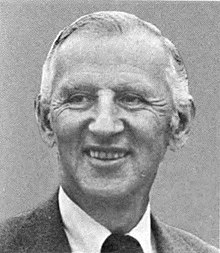Sidney R. Yates
| Sidney R. Yates | |
|---|---|
 |
|
| Member of the U.S. House of Representatives from Illinois's 9th district |
|
|
In office January 3, 1965 – January 3, 1999 |
|
| Preceded by | Edward R. Finnegan |
| Succeeded by | Jan Schakowsky |
|
In office January 3, 1949 – January 3, 1963 |
|
| Preceded by | Robert Twyman |
| Succeeded by | Edward R. Finnegan |
| Personal details | |
| Born |
Sidney Richard Yates August 27, 1909 Chicago, Illinois |
| Died | October 5, 2000 (aged 91) Washington, D.C. |
| Political party | Democratic |
| Spouse(s) | Adeline Holleb (1914–2002) |
| Children | Stephen R. Yates (1940–2000) |
| Religion | Judaism |
Sidney Richard Yates (August 27, 1909 – October 5, 2000) was a politician from the state of Illinois.
Yates was born in Chicago, Illinois, the youngest of six children of Lithuanian immigrants. His parents were Louis and Ida Yates. Yates grew up in Chicago and he graduated from the University of Chicago in 1931 with a degree in philosophy and earned a law degree there in 1933. In the mid-1930s, he played semiprofessional basketball and practiced law. He also worked for Illinois state agencies overseeing railroads and commerce. He served in the United States Navy during World War II. He is the longest-serving member ever of the United States House of Representatives from the state of Illinois.
From 1949 to 1963 and 1965 to 1999, Yates served in the House of Representatives as a Democrat. Although the boundaries of his district changed over the years, it was invariably centered on the lakefront wards of Chicago. Yates was one of the first congressmen to speak out against age discrimination, arguing in 1951 that mandatory retirement of workers was wrong and deprived older people of their right to lead a proud, productive and independent life.
During the late 1950s, after a series of lurid magazine articles and Hollywood films helped to sensationalize youth gangs and violence, Yates called for legislation to ban automatic-opening or switchblade knives, proclaiming that "Vicious fantasies of omnipotence, idolatry...barbaric and sadistic atrocities, and monstrous violations of accepted values spring from the cult of the weapon, and the switchblade knife is included in this. Minus switchblade knives and the distorted feeling of power they beget—power that is swaggering, reckless, and itching to express itself in violence—our delinquent adolescents would be shorn of one of their most potent means of incitement to crime." The ban on switchblade knives was eventually enacted into law as the Switchblade Knife Act of 1958. Rep. Yates and other congressmen supporting the Switchblade Knife Act believed that by stopping the importation and interstate sales of automatic knives (effectively halting sales of new switchblades), the law would reduce youth gang violence by blocking access to what had become a symbolic weapon. However, while switchblade imports, domestic production, and sales to lawful owners soon ended, later legislative research demonstrated that youth gang violence rates had in fact rapidly increased, as gang members began using firearms instead of knives.
...
Wikipedia
